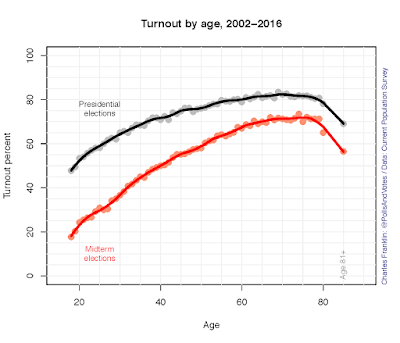It is quite rare for me to be against any kind of voting reform. After all, I started OpaVote for the primary purpose of promoting ranked-choice voting. But when it comes to the supposed reform of lowering the voting age from the current standard of age 18 to something lower, I am dead set against it.
Here is my reasoning in a nutshell: I don’t see lowering the voting age as having any significant impact in improving voter turnout. To the extent that people or organizations advocate for lowering the voting age, they are distracting us from real reforms that could make a difference.
Voting Reforms that Could Make a Difference
I’ll limit myself to voting reforms that are focused on improving voter turnout since that seems to be the objective of advocates of lowering the voting age.
Voter turnout in the U.S. is quite low. The graph above shows voter turnout by age for U.S. presidential elections and midterm elections. For state and local elections that occur at different times, the turnout is even lower.
Here are some possible voting reforms that could have a huge impact in increasing voter turnout:
- Making election day a national holiday
- Moving election day to a Saturday or a Sunday
- Allowing early voting or voting over multiple days
- Making it easier to vote by absentee ballot
- Making it easier to register to vote (motor voter laws, same day voter registration, etc.)
- Having state and local elections on the same day as federal elections
Any of the above reforms could have a huge impact in increasing voter turnout.
Lowering the Voting Age Won’t Make a Difference
The above graph shows voter turnout by age. The correlation between age and voter turnout is remarkable. Not only do younger people vote less than older people, but there is a continual decline in voter turnout as voters get younger. 18 year olds vote less often than 20 year olds who vote less often than 22 year olds, and so forth.
Suppose that we allow 16 year olds to vote. What is the most logical conclusion? That 16 year olds will vote even less often than 18 year olds. What does that accomplish? Not much.
Some proponents of lowering the voting age contend that lowering the voting age will somehow increase voter turnout across the board. I suppose the idea is that if we instill the importance of voting to impressionable youngsters, then they will be more likely to vote throughout their lives. It sounds nice, but given the above chart, I just don’t believe it.
What age if not 18?
We need some age threshold for voting, and we are not going to allow infants to vote. An age threshold of 18 seems like an eminently reasonable choice since many legal rights start at age 18.
There are some rights that occur at less than 18 years of age. Children less than 18 can work, pay taxes, and drive cars. But these other rights occur at all different ages and vary from state to state. For example, 14 year olds in Alaska and North Carolina can get married.
Most proponents of lowering the voting age focus on lowering the age to 16. But if 16, why not 14, if 14 why not 12. Where do we stop?
For better or for worse, age 18 is the traditional age of adulthood in the United States, and many important rights are conveyed at this age, such as emancipation from your parents. It is hard to justify another age that makes more sense than 18.
Other Considerations
In my view, the arguments presented above make it clear that we should keep the voting age at 18. There are other considerations as well, however, and I present these last because they are more controversial and because I’m not really qualified to opine on them. For that reason, I’ll present them as questions and not try to answer them.
If the voting age is reduced to an age less than 18, will parents improperly influence their children or even force them to vote a certain way? It seems that parents could enter voting booths with their children. How would we prevent that?
Brain development progresses rapidly with teenagers and continues until we reach 25-30 years (interesting article). The brains of 18 year olds are certainly more developed than 16 year olds. How do we take this into account when determining the voting age?
An interesting side note. The article linked above states that the development of girls’ brains is about two-years ahead of boys’ brains. Maybe we should have a voting age of 18 for boys and 16 for girls?
